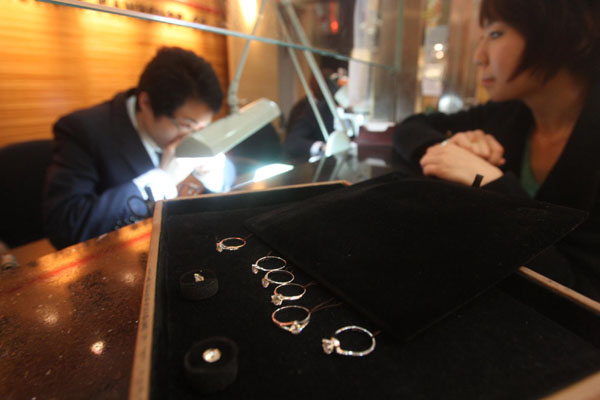A new deal
Updated: 2012-12-10 09:35
By Xiao Xiangyi (China Daily)
|
|||||||||||
 |
|
Today, diamonds and luxury goods are common in China’s pawnshops. Shi Huili / For China Daily |
Pawnshops were banned after New China's founding but are re-emerging with a friendlier face. Xiao Xiangyi reports.
Related: Luxury defined
The traditional image of a pawnshop is dark and desperate. Typically in China, as elsewhere, they were a place where the poor went to put food on the table and entering one came with a large slice of social stigma attached.
That may have been true of traditional Chinese pawnshops, which disappeared nearly half a century ago, but the new model is quite different.
The dusty rooms, abacuses and bean counters have been replaced by modern display cases, smartly dressed staff and computers. The clientele are also largely different, with wealthier individuals and businesspeople comprising the main customer base.
Pawnbrokers first appeared in China, Rome and Greece about 3,000 years ago, and are among the world's oldest financial institutions. The trade has re-emerged in China in recent years, mainly as a source of quick financing for small enterprises.
A typical customer is Wang Qinghong, who owns a small company that makes drinking straws in Tianjin. In October a supplier pushed forward the date of a down payment, and Wang had to raise all the money within two days.
"At first, the bank was the only lender I could think of, but it would have taken at least a week to get a loan from the bank," Wang says.
But the pawnshop was able to give him money a few minutes after it verified he owned an apartment.
"Efficiency, convenience, flexibility and customized service make pawnshops a sometimes preferred financial channel for individuals and enterprises," Beijing's Huaxia Pawnshop deputy general manager Yang Jingkun says.
Huaxia has grown to become one of China's biggest pawnshops since its 1993 founding. Its 21 Beijing branches offer evening services.
The re-emergence of pawnshops is relatively new. They were banned from New China's founding until 1989, when their renaissance began.
The first new pawnshops were located near hospitals or in communities and mainly accepted gold jewelry or household appliances, Yang says.
Related Stories
Hengshan is where the heart is 2012-11-25 17:55
Luxury defined 2012-11-25 10:20
Mulberry named best luxury brand 2012-11-21 11:22
Tough on the outside 2012-11-04 14:39
Hermes homes in 2012-10-22 10:24
Today's Top News
Rescuers race against time for quake victims
Telecom workers restore links
Coal mine blast kills 18 in Jilin
Intl scholarship puts China on the map
More bird flu patients discharged
Gold loses sheen, but still a safe bet
US 'turns blind eye to human rights'
Telecom workers restore links
Hot Topics
Lunar probe , China growth forecasts, Emission rules get tougher, China seen through 'colored lens', International board,
Editor's Picks

|

|

|

|

|

|





